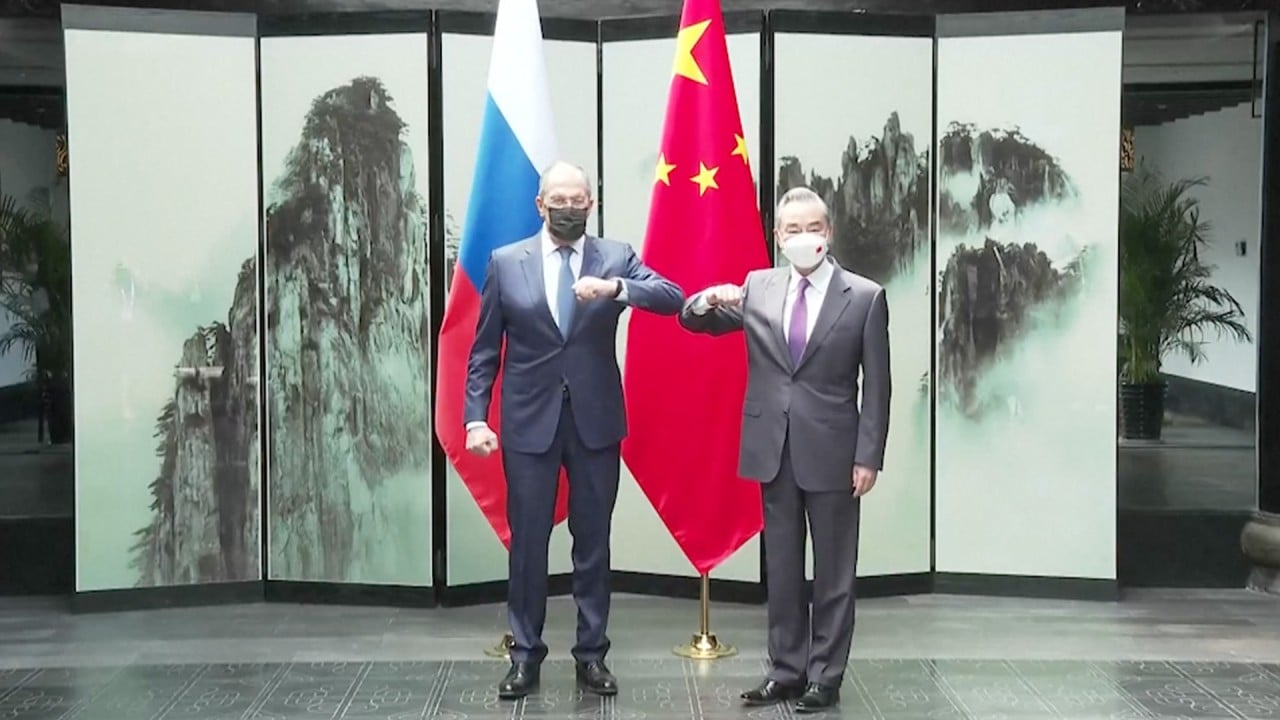
Americans say China’s relationship with Russia is serious concern, survey finds
- More than 90 per cent of respondents tell the Pew Research Centre that Beijing’s ‘no-limits’ partnership with Moscow is a threat to the US
- The survey sees a continuing slide in American favourable opinions about China, reaching the lowest point since Pew began polling the issue in 2005
Beijing’s relationship with Moscow has emerged as the dominant concern for Americans in their views of China, outweighing other worries around human rights, Hong Kong and Taiwan, and US-China economic competition, the latest Pew Research Centre survey has found.
The new concern about Beijing’s relationship with Moscow came as the survey, published on Thursday, found that Americans’ favourable views of China had slid to their lowest point since Pew began polling the issue in 2005.

More than nine of 10 respondents surveyed in the US viewed the China-Russian partnership as a serious problem for the US, according to the poll of more than 3,500 adults, which was conducted around one month into Russia’s invasion of Ukraine.
China has refused to condemn Russia’s attack, and has abstained from or voted with Russia in United Nations motions regarding the war. That position has intensified scrutiny by the US and its allies of what Beijing and Moscow described in February as their “no-limits” partnership.
The survey found that the relationship was a “very” serious problem to around 62 per cent of people, significantly higher than concerns around China’s military power (43 per cent), human rights issues (42 per cent) and tensions between China and Taiwan (35 per cent).
Should China put limits on its no-limits ties with Russia?
Just 26 per cent of respondents regarded Beijing’s handling of Hong Kong – a focus of numerous policy moves by Washington in recent years – as a very serious problem for the US.
The attention on the Russia-China relationship was likely due to the extent to which the Ukraine war has dominated news media coverage in the US, Pew researchers said.
“It does seem that what is considered a serious problem for the relationship is heavily affected by what’s in the news at the time of the survey,” Laura Silver, a senior researcher at Pew, noted.
Previous China-related surveys have bolstered that finding, she added, recalling an uptick in concern about China’s human rights record in 2021, as attention on Beijing’s policies in the Xinjiang Uygur autonomous region grew and Washington determined that those policies constituted “genocide”.
But the US public’s fixation on Russia-China ties surprised Winston Lord, a former US ambassador to Beijing who was one of the architects of Washington’s Cold War efforts to forge ties with China.
“The China-Russia partnership is a significant nuisance, but not a serious problem,” said Lord.
Because of China’s need to prioritise trade and investment with Europe, the US and the rest of Asia – and because of the history of distrust between Moscow and Beijing – Lord doubted that the partnership was “going to be around for a long time, or that it’s going to be a serious problem”.
The concerns about Beijing-Moscow ties corresponded with a broader downward spiral in Americans’ opinions of China; the Pew survey found favourable views of the country fell to record low of 16 per cent, a drop of four percentage points from 2021.

Confidence in Chinese President Xi Jinping to “do the right thing regarding world affairs” remained at a record low of just 15 per cent, while 67 per cent considered China’s power and influence to be a “major threat” to the US – a rise of five percentage points since 2020.
And for the first time in Pew’s polling history, equal numbers of respondents – 43 per cent – described China and the US respectively as the world’s top economic power.
Lord said that response from the American public was a “testament to China’s astonishing and to-be-praised growth in recent decades”.
China’s sway over Russia not enough to impact Ukraine war: analyst
But he added that it still reflected an exaggerated impression of China’s economic might and overlooked problems like the country’s ageing population, mounting debt and government crackdowns on the tech sector.
Despite the hardening of American views towards China, the survey also recorded a notable decrease in those who viewed China as an “enemy” rather than just a “competitor”, compared with a previous poll conducted two months earlier.
Some 62 per cent of respondents to the new survey characterised China as a “competitor” while 25 per cent considered it an “enemy”. In January, those numbers were 54 per cent for “competitor” and 35 per cent for “enemy”.

Pew researchers hypothesised that Russia’s military invasion of Ukraine had altered perceptions of what being an “enemy” means.
The change in survey figures “likely suggests that people don’t think about the word ‘enemy’ as clearly when it comes to China now – when they think that ‘enemy’ might mean active invasion or things of that sort”, Silver said.
While it regularly polls global public opinion about China, Pew has been unable to conduct surveys of the Chinese general public for several years, after Beijing tightened restrictions on foreign non-governmental organisations.
Even outsourcing the polling to a local organisation seems out of reach for now, Silver said.


